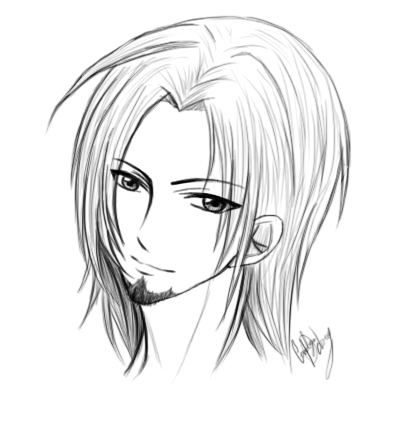Post by Deleted on Feb 26, 2013 23:00:20 GMT -5
For five months, he had put the incident behind him, by physical distance if not with emotions. He'd stopped crying after the first month, not quite coming to peace with the death of his family, but accepting the fact that mere brooding would not bring them back. For five months, he had taken pains to avoid transforming again, resuming practice of a martial art he had learned years ago for meditation: Riadachi.
Riadachi is unique from other martial arts of the same type. It does not focus and controlling and strengthening one's ki, chi, chakra or other invisible force. Rather, it is self discovery through movement. Riadachi is not about self-improvement or strength. It is about self-actualization and even self-incrimination, understanding oneself both physically and mentally, accepting what you are and learning to use what tools you've been given. As the muscles stretch and the bones twist, the truth is wrung out from one's very pores.
Five. The number of fingers on his hand. He uncurled them each one by one and twisted his palm skyward. Closed fists are for holding onto things, often unsightly ones. To open the fist is to release the thing one clings to so that they may look upon it. The next stage of the exercise involved curling one's fingers once again, not into a fist but into an open palm striking position. The open-palmed warrior is one who does not cling, but grips. He strikes with nothing to hide; he pushes. The next step was to relax his hands, baring them forward like a grappler. Open hands with flexible fingers cannot be aggressive, but they can use an opponent's strength against them. They can also transcend combat as one can use them to help another or to do simple labor. Haipachi never understood the necessity of these portions of the basic form. He had no need to acknowledge that which he already knew from much practice.
But as Haipachi re-closed his fists to begin the fifth stage, he paused. Why was there no movement for the closed fist? Where open palm exhorted, a fist could punish. Where an open hand manipulated, a fist could command. The blunt force of the closed fist can be mirrored by something without fingers, a simple instrument. Fistic tools shape metal, smash enemies, open locked doors.
And they hide that which must be hidden. Destroy that which must be forgotten.
Haipachi could be calm. He could exhort, grip, and bare himself. He could choose the open palm. Haipachi could be versatile. He could grasp to communicate, to work, or to manipulate. He could choose the open hand. Or Haipachi could be powerful; punching, smashing, commanding...avenging. He could remain recluse and simple, approaching every problem similarly. He could choose the closed fist.
In fact, Haipachi did not choose the closed fist. The fist chose him.
Haipachi stretched all his muscles at once, prematurely ending the exercise. He'd made his daily progress. A smell he failed to notice before tugged at his nose.
Riadachi is unique from other martial arts of the same type. It does not focus and controlling and strengthening one's ki, chi, chakra or other invisible force. Rather, it is self discovery through movement. Riadachi is not about self-improvement or strength. It is about self-actualization and even self-incrimination, understanding oneself both physically and mentally, accepting what you are and learning to use what tools you've been given. As the muscles stretch and the bones twist, the truth is wrung out from one's very pores.
Five. The number of fingers on his hand. He uncurled them each one by one and twisted his palm skyward. Closed fists are for holding onto things, often unsightly ones. To open the fist is to release the thing one clings to so that they may look upon it. The next stage of the exercise involved curling one's fingers once again, not into a fist but into an open palm striking position. The open-palmed warrior is one who does not cling, but grips. He strikes with nothing to hide; he pushes. The next step was to relax his hands, baring them forward like a grappler. Open hands with flexible fingers cannot be aggressive, but they can use an opponent's strength against them. They can also transcend combat as one can use them to help another or to do simple labor. Haipachi never understood the necessity of these portions of the basic form. He had no need to acknowledge that which he already knew from much practice.
But as Haipachi re-closed his fists to begin the fifth stage, he paused. Why was there no movement for the closed fist? Where open palm exhorted, a fist could punish. Where an open hand manipulated, a fist could command. The blunt force of the closed fist can be mirrored by something without fingers, a simple instrument. Fistic tools shape metal, smash enemies, open locked doors.
And they hide that which must be hidden. Destroy that which must be forgotten.
Haipachi could be calm. He could exhort, grip, and bare himself. He could choose the open palm. Haipachi could be versatile. He could grasp to communicate, to work, or to manipulate. He could choose the open hand. Or Haipachi could be powerful; punching, smashing, commanding...avenging. He could remain recluse and simple, approaching every problem similarly. He could choose the closed fist.
In fact, Haipachi did not choose the closed fist. The fist chose him.
Haipachi stretched all his muscles at once, prematurely ending the exercise. He'd made his daily progress. A smell he failed to notice before tugged at his nose.



 Jorlaxl, master of crane.
Jorlaxl, master of crane.